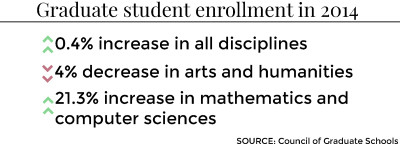
A report released Thursday by the Council of Graduate Schools shows an increase in overall nationwide graduate program enrollment, but a decrease in the enrollment of arts and humanities programs specifically.
Enrollment for graduate programs increased nationwide by 0.4 percent between Fall 2013 and Fall 2014, the report found.
According to the report, over the same period, first-time graduate enrollment grew in six broad fields of study, including mathematics and computer sciences (up 21.3 percent), engineering (up 10.7 percent) and health sciences (up 6.1 percent.)
Graduate enrollment declined, however, in arts and humanities (down 4.0 percent) and social and behavioral sciences (down 3.1 percent).
“By broad field of study, the largest number of applications for Fall 2014 were in engineering, health sciences, and business,” the report stated. “Among all applications for which broad fields of study were known, these three fields accounted for 43.2 percent of all graduate applications for Fall 2014.”
Jeffrey Hughes, associate dean of Boston University’s Graduate School of Arts and Sciences, says BU’s own numbers reflect those found in the report as graduate enrollment increases all around BU.
“We have a push to increase [graduate enrollment],” Hughes said. “Where it makes sense to grow masters programs is programs that lead to not necessarily a profession, but a definable career path … The growing areas are the places that students will go because they think they’ll have better job prospects if they have the degree.”
The report also stated that the majority of all first-time graduate students in Fall 2014 were enrolled in programs leading to a master’s degree or a graduate certificate. Hughes stressed the difference between master’s and Ph.D. programs.
“Master’s degrees are degrees that students try to get because they feel it will increase their chances in getting a job in whichever profession or area of career,” he said. “Ph.D.s are really are geared towards research or academia, at least that’s what most students who are looking to get Ph.D.s end up doing. That’s where they think they’re going.”
Melanie Matthies, a professor of speech, language and hearing sciences in Sargent College of Health and Rehabilitation Sciences, said the programs within Sargent are “robust,” offering Ph.D. degrees in speech, language and hearing sciences, rehabilitation sciences and human physiology.
“The primary goal of all three programs is to help students become excellent researchers so that they can contribute to the knowledge base of their scientific area,” she wrote in an email. “Doctoral students work in labs with outstanding Sargent faculty mentors in their Ph.D. programs and go on to get excellent jobs.”
Hughes said he doesn’t know if the Ph.D. programs at BU will grow anytime soon, but is nonetheless confident in the programs’ reputation.
“It’s a long term investment but the reputation of an institution amongst other academics is largely a significant factor. In it is quality of Ph.D. [recipients] that came out of your institution and subsequently [come] into the field and thrive,” he said. “That’s why you have Ph.D. programs, because they’re intrinsically important, you don’t have them to make money.”
Additionally, Hughes said Ph.D. programs attract the best faculty to BU.
“You’ll only get the best faculty if you’ve got the best Ph.D. students for them to work with, and in the long term to enhance the reputation of the university, so that’s why you do it,” he said.
Matthies said she sees the ever-increasing complexity and fast pace of health sciences as a main factor in graduate enrollment for the field.
“Often, faculty must consider inter-professional education, social determinants of health and/or other systems-based knowledge that their students may need to master,” she said. “We are also dealing with changes in research funding models and the ramifications of the Affordable Care Act while working with doctoral students on their curricular plans.”
Hughes said undergraduates and anyone entertaining the thought of furthering their education after four years should not automatically go to grad school just because it is thought to be the next step.
“High school, it’s all about getting into college. College should not be all about getting into grad school,” he said. “Grad school is when you’ve made up your mind about what it is you want to do with your life, or at least the greater part of your life and the qualifications or additional training you need to pursue that.”



















































































































